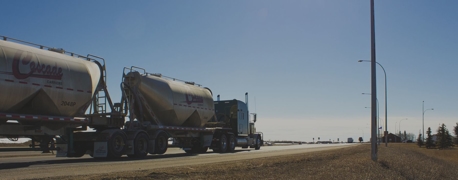How to Drive a Semi-Truck Safely During Winter

For better or worse, the transportation of goods doesn't stop due to severe weather. As a result, truck drivers navigate some of the most hazardous conditions seen on American roads throughout the winter months. As the coldest temperatures approach, our attorneys believe it's crucial to discuss the dangers of driving a large truck through severe weather.
Black ice, road hazards, snowstorms, and inexperienced drivers are just a few of the dangers that come with driving a truck during winter. The following tips can help you safely navigate the nation’s highways this winter and help to protect yourself and others.
Tips for Driving a Truck in Winter
Know Your Limits
Having too much confidence can be dangerous while driving in a snowstorm. Stay updated on the latest weather reports, and remember that the storm may become progressively more severe as you drive. If your vehicle is near its limits, it is time to stop—the worsening weather could turn a dangerous situation into a deadly one. Deciding to pull over is always the best way to handle severe weather.
If you do decide to stop, make sure you are resting in an area that is safe from collisions with other vehicles.
Know What Conditions Are Ahead
Don’t rely solely on satellite radio for your traffic reports. Utilizing a citizen’s band radio could inform you of local hazardous conditions more quickly. By combining your sources of information, you’ll be better prepared for unexpected storms and conditions that suddenly change from serious to extreme and potentially deadly.
Prepare Your Equipment
Preparing your rig can dramatically increase its ability to handle severe weather. Buying snow tires can drastically improve your truck’s handling on winter roads. Additionally, make sure your truck is equipped with chains that will enhance its traction on a snowy or iced-over road.
In extremely cold temperatures, do not forget to winterize your fuel. When diesel fuel gels, it cannot be used as a source of energy for your truck. Being stranded because of gelled fuel is a frustrating and avoidable event.
Be Prepared to Face the Conditions
Having your truck stocked with the proper tools and attire will help you handle the challenges presented by cold weather safely, comfortably, and efficiently. Gloves, rain and snow gear, blankets, jumper cables, and other winter equipment will help you overcome the challenges of working in harsh elements.
Having gear that'll keep you warm will also help you handle unexpected breakdowns in the cold. A broken-down truck in subfreezing temperatures can become an especially dangerous situation if help cannot arrive until the weather has improved. Additionally, don't forget to store emergency food and water so you can stay fed and hydrated while stranded.
Check Your Cargo
Checking the cargo on your trailer is crucial, especially as you head into a storm that can be accompanied by strong winds. Take the extra time to secure loose items so that your truck’s load won’t inhibit its performance in icy or wet conditions.
Perform a Safety Inspection
Before leaving, each driver should check their vehicle thoroughly, conducting an informal safety inspection of various parts of the truck, including the brakes, tire pressure, tire tread, and the connection between the cab and the trailer.
Always Assume the Road Is Icy
Always drive as though ice may have formed on the road. Importantly, never forget that black ice can be “invisible" and is responsible for many unexpected and deadly accidents. If temperatures are freezing, ice can form even in the absence of rain or snow. In fact, road icing causes more deaths each year than all other types of weather conditions combined.
Adjust Your Speed
Black ice is an invisible killer. Driving over it at full speed can result in losing control, something that's especially dangerous if smaller vehicles are nearby. Even if conditions are not wet, black ice can still form. Be wary of bridges as they can gather black ice faster than roads.
Drive slower than normal and be prepared to stop your truck slowly if you hit an ice patch. Avoid driving in the ruts created by other vehicles—their weight can compact snow and make it harder for your tires to find traction.
Finally, remember that speed limits aren’t something you should strive for during icy conditions. Instead, your truck should only travel at a speed that will allow it to stop safely. If you’re unwilling to go as fast as other vehicles are traveling, never hesitate to allow them to pass you.
The 2021 Fort Worth Pileup on I-35: A Worst Case Scenario for Winter Driving
On February 11, 2021, the worst-case winter driving scenario happened on a section of Interstate 35 West in Fort Worth. Overnight rain and freezing temperatures caused roads throughout North Texas to gather an unusual amount of ice.
During the early morning, a pileup was triggered when vehicles traveling down I-35 slammed into each other as they were unable to stop because of the severely iced-over highway. Footage from horrified witnesses showed vehicle after vehicle slam into each other. However, the most devastating collisions occurred when out-of-control semis slammed into the crashed vehicles.
One video showed a large FedEx 18-wheeler tear through stopped vehicles with such force that it was launched up and over them. Pictures from the accident show that cars in the path of this sliding semi exhibited a devastating amount of damage when compared with vehicles that weren’t in the large truck’s path. In some instances, only the bottom half of damaged vehicles were recognizable.
When the incident was over, over 100 cars and trucks were mangled in the wreckage. At least six people were killed, and dozens required treatment in local hospitals.
Who Is Responsible for Winter Truck Accidents?
Even if you know how to drive a truck in the winter, you could be involved in an accident caused by other drivers or by failures to maintain safe road conditions. Vehicle defects can also cause serious weather-related accidents. Mother Nature herself cannot be held legally responsible for causing a snowstorm that causes a collision, but an investigation may reveal other contributing factors. Bad weather alone is often not the cause of a crash. It can be traced to carelessness or reckless behavior, a lack of preparation, or defective roads. Winter weather will exacerbate these issues and may make a collision more likely, but fault may still lie with another party.
The following are examples of who may be responsible for a winter-related truck accident:
- A motorist who is speeding, driving while distracted, or driving under the influence of alcohol or drugs.
- The manufacturer of a defective or poorly designed automobile or truck part, including tires, brakes, wipers, suspension systems, and more.
- A municipality that is responsible for maintaining and clearing snow from highways, city streets, bridges, and other roadways.
- Trucking companies that pressure drivers into driving in bad weather, fail to maintain their fleet, or commit hours-of-service violations.
- Loading and shipping companies that improperly load cargo onto a tractor-trailer or 18-wheeler.
Accident reconstruction specialists, investigators, medical experts, and a number of other professionals can work to determine the cause of a collision, the value of a case, and who should be held responsible.
Can Truckers Refuse to Drive in Bad Winter Weather?
Just because you know how to drive a truck in winter weather doesn't mean that you should. Trucking companies should be aware of weather conditions and should not pressure their drivers to take to the road when it is too dangerous. Truck drivers should also check the weather and road conditions regularly to make sure they know what to expect. If they notice that conditions seem too hazardous, they should be able to speak up without fear that they will be fired, demoted, or otherwise penalized.
Under the Surface Transportation Assistance Act (STAA), employers are prohibited from firing, disciplining, or discriminating against commercial drivers for refusing to drive because they have a reasonable fear of serious injury to themselves or others as a result of hazardous conditions. A truck driver who is fired or penalized for refusing to drive may be able to take legal action against their employer to recoup financial losses and seek job reinstatement.
At Arnold & Itkin, we represent truck drivers and all motorists who have been seriously injured in collisions in any weather. We believe in holding big companies accountable for cutting corners when it comes to safety, pressuring truckers to work long hours and drive in bad weather, and putting profits before helping the injured recover what is rightfully theirs.
If you have been involved in a winter accident, call the truck accident attorneys at Arnold & Itkin today at (888) 493-1629. Our legal team is ready to provide a free consultation of your case.
- Categories


